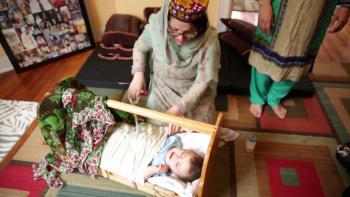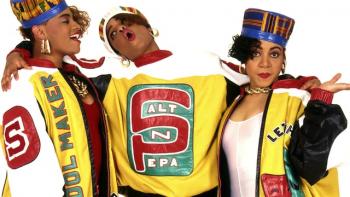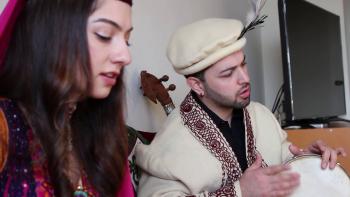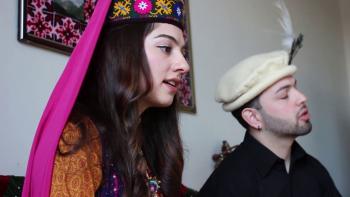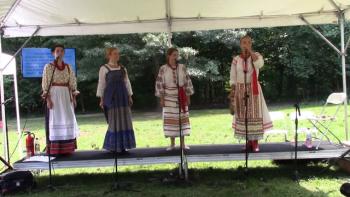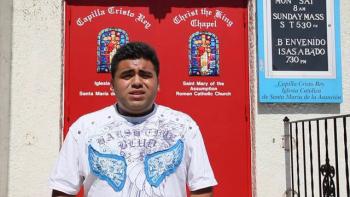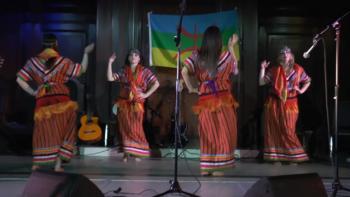Browse Digital Heritage
At home in Brooklyn, thousands of miles from the Hunza Valley of northern Pakistan, Amina Bibi passes on the Wakhi language to her 1-year-old son Alhan - through lullabies. In Wakhi with Wakhi and English subtitles by Husniya Khujamyorova. Part of the Lullabies of New York Project, supported by the Brooklyn Arts Council.
In the second video, Jamila Bibi, a Wakhi speaker from the Gojal Valley in the Hunza District of northern Pakistan, tells the story of her family and her language. In Wakhi with Wakhi and English subtitles by Husniya Khujamyorova.
Verbal Arts
Music
Mirgulova Shirmo, a Rushani speaker originally from Vamar in the Rushan region of Tajikistan, sings a Rushani lullaby. In th second video, she discusses the lullaby and its wider context in her life. Part of the Lullabies of New York Project, supported by the Brooklyn Arts Council. In Rushani with Rushani and English subtitles by Husniya Khujamyorova.
Verbal Arts
Music
Fashion Designer Daniel "Dapper Dan" discusses the development of african american fashion during the birth of hip hop.
Material Culture
Wakhi speaker Rahila Babar, originally from Upper Hunza in Pakistan but now living in New York, sings a famous Wakhi song, accompanied by musician Shahid Ahmed Khan.
Music
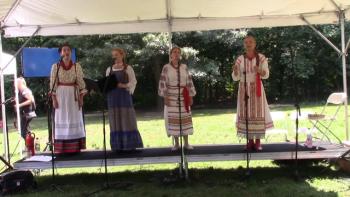
"Slava Tebye Bozha (Glory to You Lord)" - a call-and response field song ending in a wedding ceremony. Valentina Kvasova adds to the description in an interview at Brooklyn Arts Council
Music
Wakhi speaker Rahila Babar, originally from Upper Hunza in Pakistan but now living in New York, sings a Khowari song, accompanied by musician Shahid Ahmed Khan
Music
"Kolechko (Ring)" - a lyrical tune about a ring symbolising the strained relations between two lovers is shared by Cossack singer Valentina Kvasova at the Brooklyn Roots Festival 2019.
Music
Tour the Staten Island neighborhood of Port Richmond with young traditional dancer Jesus Almedo
Place
Foodways
Dance
Tafsut Imazighen, meaning "Berber Spring" is a dance group of young women who perform traditional Kabyle dance with touches of contemporary choreography. They are performing here for annual Yennayer celebration held at Murmrr Theater in Prospect heights, Brooklyn. Yennayer is the indigenous new year for North Africans.
Dance
Toshie Kenney creates a work in 書道 (Shodō) or Japanese calligraphy, of the Daoist proverb, 井の中の蛙大海を知らず (The frog in the well knows nothing of the great ocean).
Material Culture
Eva Walker performs 醉漁唱晚 (Zui Yu Chang Wan), or Evening Song of the Drunken Fisherman, on the gǔqín.
Music
Search
Tradition
- Music (47) Apply Music filter
- Material Culture (23) Apply Material Culture filter
- Ritual (19) Apply Ritual filter
- Place (14) Apply Place filter
- Belief (12) Apply Belief filter
- Foodways (12) Apply Foodways filter
- Verbal Arts (12) Apply Verbal Arts filter
- Dance (11) Apply Dance filter
- Occupation (7) Apply Occupation filter
- Migration (6) Apply Migration filter
- Health (4) Apply Health filter
Collection
- Survive, Remember, Thrive: Armenian Traditions in Western New York (9) Apply Survive, Remember, Thrive: Armenian Traditions in Western New York filter
- Brooklyn Folk & Folk Artists Series (5) Apply Brooklyn Folk & Folk Artists Series filter
- The Non-Gujarati Jains (5) Apply The Non-Gujarati Jains filter
- Freeport Waters (4) Apply Freeport Waters filter
- Lullabies of New York (4) Apply Lullabies of New York filter
- Superstorm Sandy (4) Apply Superstorm Sandy filter
- Heritage Ambassadors (2) Apply Heritage Ambassadors filter
- New York City Beatz Coronavirus (2) Apply New York City Beatz Coronavirus filter
- North Country Heritage Awards (1) Apply North Country Heritage Awards filter
Community
- Brooklyn Arts Council (26) Apply Brooklyn Arts Council filter
- Castellani Art Museum of Niagara University (12) Apply Castellani Art Museum of Niagara University filter
- City Lore (10) Apply City Lore filter
- Long Island Traditions (9) Apply Long Island Traditions filter
- Arts Westchester (7) Apply Arts Westchester filter
- Endangered Language Alliance (6) Apply Endangered Language Alliance filter
- Staten Island Arts (4) Apply Staten Island Arts filter
- The Arts Council of the Southern Finger Lakes (4) Apply The Arts Council of the Southern Finger Lakes filter
- Traditional Arts Upstate New York (4) Apply Traditional Arts Upstate New York filter
- Esraa Warda (3) Apply Esraa Warda filter
- GO Art (3) Apply GO Art filter
- Brooklyn Public Library (2) Apply Brooklyn Public Library filter
- Center for Traditional Music and Dance (2) Apply Center for Traditional Music and Dance filter
- New York State Old Tyme Fiddlers' Association (2) Apply New York State Old Tyme Fiddlers' Association filter
- The Folklife Center at Crandall Public Library (2) Apply The Folklife Center at Crandall Public Library filter
- Mind-Builders Creative Arts Center (1) Apply Mind-Builders Creative Arts Center filter
- New York Folklore (1) Apply New York Folklore filter
Culture
- United States (10) Apply United States filter
- Armenia (9) Apply Armenia filter
- India (8) Apply India filter
- African-American (5) Apply African-American filter
- China (4) Apply China filter
- Finland (4) Apply Finland filter
- Pakistan (4) Apply Pakistan filter
- Tajikistan (4) Apply Tajikistan filter
- Mexico (3) Apply Mexico filter
- Paraguay (3) Apply Paraguay filter
- Puerto Rico (3) Apply Puerto Rico filter
- Trinidad and Tobago (3) Apply Trinidad and Tobago filter
- Dominican Republic (2) Apply Dominican Republic filter
- Morocco (2) Apply Morocco filter
- Russia (2) Apply Russia filter
- Ukraine (2) Apply Ukraine filter
- Uzbekistan (2) Apply Uzbekistan filter
- Algeria (1) Apply Algeria filter
- Canada (1) Apply Canada filter
- Gambia (1) Apply Gambia filter
- Ghana (1) Apply Ghana filter
- Guinea (1) Apply Guinea filter
- Guinea-Bissau (1) Apply Guinea-Bissau filter
- Guyana (1) Apply Guyana filter
- Haudenosaunee (1) Apply Haudenosaunee filter
- Ireland (1) Apply Ireland filter
- Italy (1) Apply Italy filter
- Japan (1) Apply Japan filter
- Korea, South (1) Apply Korea, South filter
- Mohawk Nation at Akewesasne (1) Apply Mohawk Nation at Akewesasne filter
- Mongolia (1) Apply Mongolia filter
- Nigeria (1) Apply Nigeria filter
- Onöndowa’ga:’ (Seneca) (1) Apply Onöndowa’ga:’ (Seneca) filter
- Peru (1) Apply Peru filter
- Sri Lanka (1) Apply Sri Lanka filter
Media Type
- (-) Remove Video filter Video

